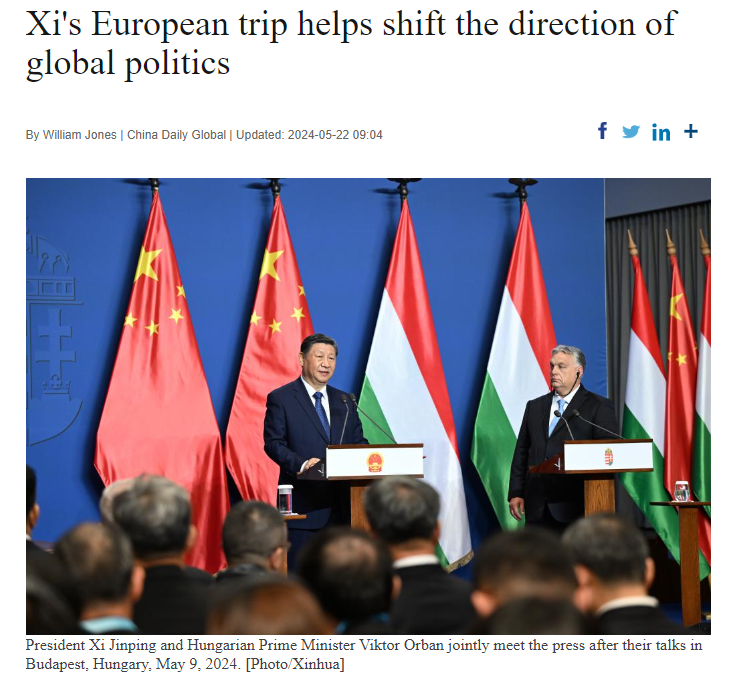LATEST INSIGHTS
Your Present Location: LATEST INSIGHTSWilliam Jones: Xi's European trip helps shift the direction of global politics
Source: CD Published: 2024-05-22

This six-day trip of Chinese President Xi Jinping to Europe has served to shift the global trajectory away from the danger of war to a more fruitful path. As the forces of NATO and the West remain focused on endlessly continuing the conflict in Ukraine until it leads to a global confrontation, there are also forces within the West that are working to inject some reason into this untenable and dangerous situation. President Xi, through his head-of-state diplomacy, has effectively tapped into this.
The trip to France coincided with the 60th anniversary of China's diplomatic relations with France, the first 'Western nation 'to establish ties with the People's Republic of China. This was an important psychological element in countering what is an intensive propaganda narrative blaring out of the Western media under the influence of the Anglo-American war mongerers. In addition, the personal relationship which French President Emmanuel Macron seems to have developed with the Chinese President gives a clear signal that things may well change.
After rather formal trilateral talks that included European Union President Ursula Von der Leyen, the visit took on a more pleasant and constructive tone, with Macron pointedly repeating a personal gesture accorded to him by President Xi during his own visit to China earlier, by taking Xi to a village where Macron had spent time as a child with his grandmother.
The two countries signed a number of agreements during the course of the visit, with major benefits being held out to the all-important French agricultural sector as well as to France's aerospace sector. While Macron is not yet totally in sync with China's attempt to have a cease-fire and peace negotiations in dealing with Ukraine, his call for an 'Olympic truce' may prove to be a useful step in that direction. He's also faced with the need to balance the real interests of his own constituents with the demands of the Western elites for 'de-risking' from China and war with Russia. The visit clearly indicated that the benefits for French farmers and for French industry lie in maintaining a smoother relationship with the People's Republic of China.
From Paris, President Xi went on to visit Serbia's President Alexander Vucic. Here there was more mutual understanding with regard to the global situation. Serbia is a country that has maintained continual close ties with China — and with Russia — and was the first European nation to establish a strategic partnership with China. It did not go unnoticed that President Xi arrived in Serbia on May 7, the 25th anniversary of the NATO bombing that destroyed the Chinese Embassy in Belgrade and killed three Chinese journalists. While he did not visit the memorial in Belgrade to the fallen journalists, the timing of the visit clearly sent out a message that the event was far from forgotten.
President Xi called China's relationship with Serbia an 'ironclad friendship'. Most importantly, Serbia will be the first European country to sign a free trade agreement with China beginning July 1, and the relationship has been upgraded to a 'China-Serbia community with a shared future in the new era'. President Xi was also warmly welcomed by the people of Serbia. On the last day of his visit to the Palace of Serbia, there were thousands of people in the square below to greet the President waving Chinese and Serbian flags. One could clearly see from the reaction of the people gathered there that the visit of the Chinese president was seen as an extremely happy moment for a population that has been under the gun of the EU bureaucracy for not haven broken its centuries-long relationship with Russia. President Vucic himself was personally quite moved by having President Xi visit him here at this time.
The last leg of Xi's trip covered Hungary. Hungary was the first European country to join the Belt and Road Initiative. Hungarian Prime Minister Viktor Orban is the most outspoken European leader to have criticized NATO's continued war against Russia. While Orban has been castigated by the Brussels crowd as being outside the bellicose 'mainstream' of present EU policy, he has been conducting a continual battle to take the EU and NATO off its present path toward war. The visit of the Chinese president was of crucial strategic significance since Hungary will now take over the EU chairmanship, and can, in that position, play an even more crucial role in taking the EU off the war path.
The author is the former Washington Bureau Chief for EIR News Service and a Non-resident Fellow in the Chongyang Institute for Financial Studies.























































































 京公网安备 11010802037854号
京公网安备 11010802037854号





